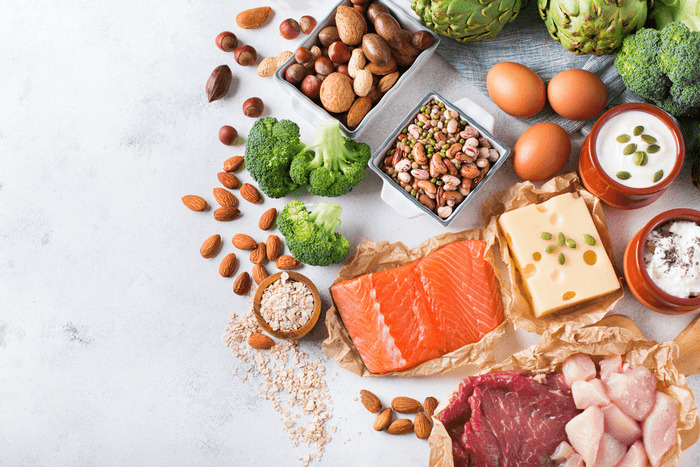How to Get Enough Protein While Intermittent Fasting
Written by Andrew Brewer. ⚕️Reviewed and fact checked by our medical team.
During your eating windows, it’s time to load up on protein. It will help you feel better as you fuel healthy muscles, keeping your stomach fuller longer to power you through the intermittent fasting windows. Despite being so important, many people still struggle with getting enough protein. It can be a challenge, especially if you’re a vegetarian or vegan, so you’ll want to start by understanding exactly how much protein you need.
Now you’ve got a number in mind, here are seven ways to help you get enough protein while intermittent fasting. We’ve all heard that we need to eat more protein, but what does that mean? What foods contain the most bang for your buck when you’re looking to add more protein to your diet? The list below can help.
Key Takeaways
- Protein is essential for fueling healthy muscles and keeping you feeling fuller longer during intermittent fasting.
- There are many ways to increase your protein intake during your eating windows, including eating meat, eggs, nuts, seeds, lentils and quinoa, dairy products, and protein shakes.
- It’s important to listen to your body and adjust your protein intake as needed, while also being mindful of hydration and not relying solely on protein shakes as a source of protein.
Meat
When you hear about eating more protein, meat is often the first thing that comes to mind, and with good reason. It’s jam packed with protein, just make sure that you’re careful about the type of meat you eat. Chicken breasts, lean beef, salmon, turkey breast, and shellfish are all high in protein. Avoid fatty meats, as your body will have difficulty processing them.
Eggs
Eggs are another great source of protein. While the egg whites are where you’ll get the most, the yolk too provides a lot of vitamins, minerals, healthy fats, and other nutrients. Crack an egg over a meal or eat eggs for breakfast.
Nuts
Nuts contain a lot of protein, so if you’re up for a snack, grab some almonds or peanuts. Slather peanut butter over some whole wheat toast for a quick boost.
Seeds
Like nuts, seeds have a lot of protein, especially pumpkin and sunflower seeds. You can snack on them independently or mix them into your meals for an added crunch. You’ll trick your body into eating more protein and enjoy it!
Lentils and Quinoa
Lentils and quinoa are another way to integrate more protein in your diet. These can be an acquired taste, so make sure that you learn how to prepare them properly. Once you do, you’ll wonder how you ever lived without them, especially if you follow a vegetarian or vegan diet.
Dairy
Cottage cheese, greek yogurt, milk contain protein among other nutrients to supercharge your diet. They’re often low in calories but high in vitamins and minerals, including protein. Swap these dairy products in your recipes for additional benefits.
Protein Shakes
Protein shakes are a great, concentrated way to boost your protein intake, but remember, protein shakes are a supplement. They should never replace eating in your diet. They can help you reach your goals but should never be your only source of protein during eating windows.
Blend your protein powder with water or milk and start sipping. You’ll be getting protein with each swallow, and you won’t even notice! Protein shakes can be unflavored, but if you’re looking to trick your tastebuds into thinking it’s a milkshake, you can try chocolate, vanilla, and other flavorings.
Check the nutritional label to make sure you’re making it correctly. Often, people add too many scoops and wonder why they start gaining weight. There is a threshold when protein becomes too much and you’ll notice weight gain in all the wrong places. Skip adding additional nutrients too. Make the shake as directed for the best results.
Final Say on Increasing Your Protein Intake
During your eating windows, it’s essential that you get lots of protein, fiber, healthy fats, and other nutrients. What you eat is so important to help fuel your intermittent fasts, ensuring that you have enough energy to power through, so get creative in how you integrate more protein into your diet!
FAQ
-
How does intermittent fasting affect protein intake?
Intermittent fasting can make getting enough protein in your diet challenging, especially if you have a shorter eating window.
-
What are some good protein sources for people on intermittent fasting?
Some good sources of protein for people who are intermittent fasting include lean meats, poultry, fish, eggs, Greek yogurt, and protein supplements.
-
How much protein should I consume while intermittent fasting?
The amount of protein you consume during intermittent fasting depends on your body weight, activity level, and goals. However, a general recommendation is to consume 0.8-1 gram of protein per pound of body weight daily.
-
Can I consume all of my daily protein during my eating window while intermittent fasting?
Yes, you can consume all of your daily protein during your eating window while intermittent fasting, as long as you meet your daily protein requirements.
-
Should I consume protein before or after my workout while intermittent fasting?
Consuming protein after your workout while intermittent fasting is recommended to aid in muscle recovery and repair.
-
Can intermittent fasting affect muscle growth?
Intermittent fasting can affect muscle growth if you consume less protein during your eating window. Therefore, it is important to meet your daily protein requirements to support muscle growth while intermittent fasting.
-
Are there any risks associated with getting too much protein while intermittent fasting?
Consuming too much protein while intermittent fasting can strain your kidneys and increase your risk for dehydration. It is important to consume protein in moderation and drink plenty of water.
